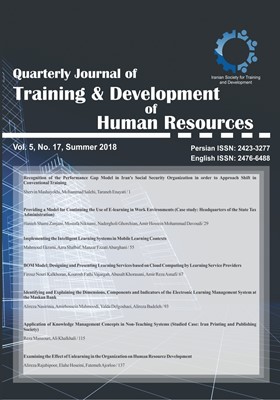Studying the Challenges of Faculty Development Programs at Shahid Beheshti University
Subject Areas :
Bahar Bandali
1
,
Mahmood Abolghasemi
2
,
MohammadHassan Pardakhtchi
3
,
Morteza Rezaeizadeh
4
![]()
1 -
2 -
3 -
4 - دانشگاه شهید بهشتی
Keywords: Faculty Development Program, Faculty Members, Lecturers, Higher Education, Shahid Beheshti University. ,
Abstract :
Paying attention to faculty development programs is one of the strategies to enhance the quality of universities. For this reason, universities try to offer various faculty development programs. Faculty members, however, have not welcomed such programs, as expected. Thus, finding the reasons needs researches and studies. Therefore, the current study seeks to identify the weaknesses of faculty development programs from academic staffs’ viewpoints. Using a phenomenological and qualitative design, semi-structured interviews were conducted with 29 lecturers at Shahid Beheshti University. The transcribed interviews were coded in 3 stages using the Strauss and Corbin framework. As a result of this study, 14 weaknesses in the current FD programs were identified, as follows: “negligence in different dimensions of faculty development”, “lack of needs assessment”, “negligence in intrinsic motivators”, “negligence in individual differences”, “low frequency and quantity of programs”, “inflexible schedules”, “weak promotion and dissemination of programs”, “disorganized programs”, “irrelevant subjects”, “irrelevant content”, “ineffective teaching-learning methods”, “low interaction and participation of faculty members”, “lack of effectiveness for evaluation mechanisms”, and “weaknesses in feedback channels”. In order to get a comprehensive view of faculty development programs, the identified weaknesses were categorized and discussed in accordance with the different curriculum components. In General, based on the findings, it can be said that faculty development programs at this university call for a major revision in the four following components: Goal, Content, Teaching-Learning method, and Assessment methods.


